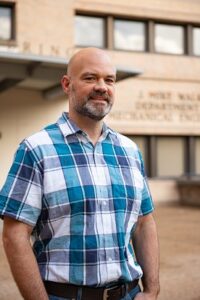
Kevin Clarno
Associate Professor
Charlotte Maer Patton Centennial Fellowship in Engineering
Affiliate Faculty, Oden Institute of Computational Science and Engineering
Distinguished R&D Staff, Joint Faculty Appointment, Oak Ridge National Laboratory
Department Research Areas:
Nuclear and Radiation Engineering
Complex Systems
Dr. Clarno is a tenured Associate Professor in the Nuclear and Radiation Engineering program at the University of Texas at Austin with a research focus on computational nuclear energy, including algorithm development for radiation transport and reactor multiphysics. Dr. Clarno worked 15 years at Oak Ridge National Laboratory (ORNL), and was also assistant professor at the University of Tennessee-Knoxville as joint faculty member in nuclear engineering. He has led national, multi-institutional high-performance computing (HPC) research programs, including the Consortium for Advanced Simulation of Light Water Reactors (CASL) as Interim Director; the CASL Physics Integration (PHI) Focus Area; modernization of the SCALE nuclear analysis software; development of the Advanced Multi-Physics (AMP) fuel performance code; and a portfolio of ORNL laboratory-directed strategic research projects. As a technical contributor at ORNL, Dr. Clarno has developed high-performance computing software, researched new algorithms for SCALE, and performed analyses of nuclear reactors for a diverse set of US Nuclear Regulatory Commission (NRC) and DOE projects.
Dr. Clarno’s primary research areas include:
- Multiphysics coupling methods for advanced simulation of nuclear reactors to integrate analyses and improve accuracy;
- Multiscale neutronics, fuel performance, and thermal-hydraulics to enable high resolution analyses in coupled physics applications;
- Design, optimization, and analysis of advanced commercial and test reactor concepts;
- Integration of software to optimize advanced manufacturing of nuclear technologies; and
- Propagation of uncertainties through multiphysics applications to optimize experiments.
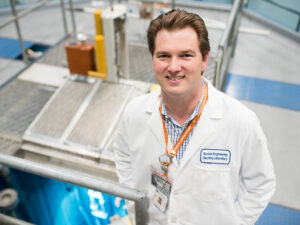
derekhaas@utexas.edu
512-468-3871
Office Location: ETC 7.136
Derek Haas
Associate Professor
Chevron Centennial Fellowship in Engineering No. 2
Department Research Areas:
Nuclear and Radiation Engineering
www.nuclear.engr.utexas.edu/radlab
Dr. Haas’s research interests focus on radiation detection for nuclear arms control, non-proliferation, and advanced reactor design and licensing. This includes the fundamental physics of radioactive decay processes, fission yields, environmental transport of radionuclides, and detection techniques. Dr. Haas’s research is primarily experimental and uses the 1.1 MW TRIGA Mark II reactor at The University of Texas at Austin. He is one of five surrogate inspectors from the United States for the Comprehensive Nuclear-Test-Ban Treaty and is a technical advisor for U.S. nuclear arms control and non-proliferation policy development. He has also contributed to the analysis of the Fukushima nuclear reactor accident and nuclear tests in the Democratic Peoples’ Republic of Korea.
Dr. Haas joined the faculty of The University of Texas after eight years at Pacific Northwest National Laboratory where he worked as a Senior Research Engineer in the National Security Directorate. He earned his bachelor’s, master’s, and doctoral degrees from UT Austin.
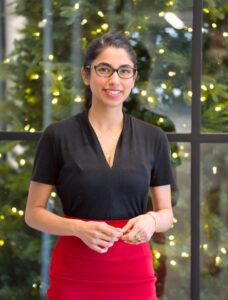
Soha Aslam
Senior Engineering Scientist
Soha Aslam is Senior Engineering Scientist at the University of Texas at Austin, specializing in the study of Nuclear Reactor Digital Twins and Neutronics Modeling and Simulations for the Molten Salt Research Reactor (MSRR). In her current role, she leads the neutronics shielding and activation analysis for the MSRR being licensed in Abilene, Texas, applying computational tools such as SCALE, Serpent, and OpenMC to model complex reactor physics phenomena. Building on her background in both physics and engineering, Soha’s work seeks to streamline the design and licensing of cutting-edge nuclear systems, bridging theoretical reactor modeling with real-world challenges of safety, efficiency, and sustainability.
Soha graduated magna cum laude with a B.S. in Physics and a minor in Nuclear Engineering from the University of Texas at Arlington, and later earned her M.Eng. from Princeton University in the Department of Mechanical and Aerospace Engineering. Through each role, Soha has honed her passion for harnessing nuclear technology responsibly, all while sharing her enthusiasm and expertise through research, teaching and mentorship.
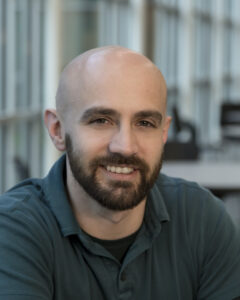
Cole Gentry
Senior Engineering Scientist
Dr. Cole A. Gentry is Senior Engineering Scientist at the University of Texas at Austin, specializing in the study of Nuclear Reactor Digital Twins and Machine-Learning-based Reduced Order Modeling.
Prior to this position, Dr. Gentry worked as a contract Software Development Engineer for Zachry Nuclear’s Numerical Advisory Solutions Group and as a Computational Nuclear Engineer both at BWX Technologies, Inc. and Oak Ridge National Laboratory. At BWXT, Dr. Gentry worked primarily on reactor analysis tools development and code qualification for the various BWXT HTGR designs. At Oak Ridge National Laboratory, Dr. Gentry focused primarily on the development and testing of Light Water Reactor (LWR) and advanced reactor simulation capabilities in both the CASL core simulator VERA and the SCALE lattice physics code POLARIS. Dr. Gentry also led a development effort in applying neural networks to reactor simulations.
Dr. Gentry graduated from the University of Tennessee with a B.S. in Nuclear Engineering and worked as a Reactor Engineer at the Sequoyah Nuclear Facility for two years before returning to the University of Tennessee to earn his M.S. and Ph.D. in Nuclear Engineering. His graduate work consisted of analysis of Fully Ceramic Micro-Encapsulated (FCM) Light Water Reactor (LWR) fuel for deep burnup applications, as well as adaptation of the traditional LWR Two-Step procedure to a plate fueled Advanced High Temperature Reactor (AHTR).
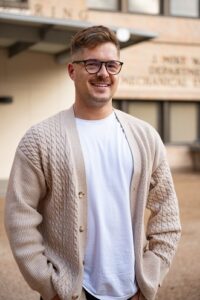
Eric Wieser
Engineering Scientist Associate
Eric is an Engineering Scientist Associate working on the groundbreaking Digital Molten Salt Reactor Initiative at the University of Texas at Austin.
He holds a B.S. in Environmental Economics and Policy from The University of California, Berkeley and an M.S. in Energy and Earth resources from UT with a focus on nuclear energy economics and finance. In his current research, he is conducting a techno-economic analysis of molten salt nuclear reactors to determine their viability as a baseload energy source capable of meeting the increasing power demands in Texas.

Ethan Rozak
Engineering Scientist Associate
Ethan is an Engineering Scientist Associate working on the Digital Molten Salt Reactor Initiative at the University of Texas at Austin.
He holds a B.S. in Mechanical Engineering from The University of Texas at Arlington. His current research is in the creation of a digital twin for Texas A&M’s Bubble Flow Loop Project. Ethan is also a member of the United States Marine Corps Reserve serving as a Corporal out of Fort Worth’s Naval Air Station Joint Reserve Base.

Nicholas Herring
Postdoctoral Fellow
Nicholas Herring is a Postdoctoral Fellow at the University of Texas at Austin in the Walker Mechanical Engineering department working on high-fidelity digital twins for the MSRR project. Dr. Herring holds a B.S. in Nuclear Engineering from North Carolina State University which he completed in May 2017, an M.S. in Nuclear Engineering from North Carolina State University which he completed in August 2018, and a Ph.D. in Nuclear Engineering and Radiological Sciences from the University of Michigan which he completed in January 2022. Following his Ph.D., Dr. Herring spent a year as a Postdoctoral Fellow at North Carolina State University before joining the University of Texas at Austin in March 2023.
Dr. Herring’s research primarily focuses on the development of deterministic methods for solving neutral radiation transport problems for radiation shielding systems and nuclear reactors. Dr. Herring also works on advanced heuristic techniques, multi-physics simulation methods, and reactor thermal hydraulics.
–
Ondrej Chvala
Senior Research Scientist
Dr. Ondrej Chvala got his Ph.D. from the Institute of Particle and Nuclear Physics at Charles University in Prague in the Czech Republic, where he worked on the NA49 experiment at CERN, investigating the soft heart of the strong interaction. After his graduation he moved to Long Island, New York, for a University of California at Riverside funded post-doctoral position on the Phenix experiment at the Brookhaven National Laboratory, where he worked on detector R&D and analysis of hard nuclear scattering. In 2012, Dr. Chvala became a Research Assistant Professor of Nuclear Engineering at the University of Tennessee, Knoxville. He taught Nuclear Reactor Theory, Numerical Methods and Fortran, he instigated and taught a study abroad Experimental Reactor Physics Laboratory in Prague and Vienna. In 2022, he became a Senior Research Fellow at the Nuclear Engineering Teaching Laboratory at the University of Texas, Austin, where he works on design and licensing of the Molten Salt Research Rector. Dr. Chvala is an author or co-author of over 380 scholarly works, including 190 journal articles.

Harrison Reisinger
Associate Research Scientist
Harrison Reisinger is an associate engineering scientist at the University of Texas at Austin working on the Molten Salt Research Reactor project. He is passionate about energy production from molten salt reactors, and hopes to see the technology brought to commercial markets. His main skill in the field is the simulation of molten salt systems using a combined effort of Python scripts and neutronic codes. Harrison grew up in Annapolis Maryland and received his Bachelors of Science in Nuclear Engineering from the University of Tennessee, Knoxville. His current goal is to attend the University of Texas at Austin for graduate school and achieve his PhD while developing a neutronic sensitivity code base for the licensing of advance reactors. harrison.reisinger@utexas.edu